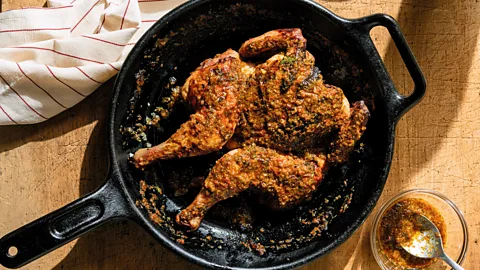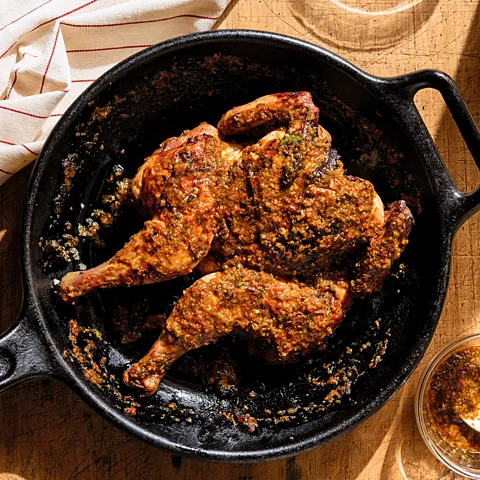By Nylah LeeFeatures correspondent

 Evan Sung
Evan SungIn his cookbook, Simply West African, chef Pierre Thiam shares his Senegalese recipe for crisp, chilli-packed piri-piri chicken.
Beyond its rough translation of "good hospitality", the West African philosophy of teraanga (sometimes spelled "teranga") means giving without expecting anything material in return, rooted in the deep cultural belief in the reciprocity of blessings. In Senegal it is a way of life, a commitment to offering the best of what one has to guests, treating them with unparalleled kindness.
"There's a word in Wolof, the syrupy mother tongue of my native Senegal in West Africa, that perfectly describes the spirit of our food culture. That word is teraanga," reflects Senegalese author, chef and restauranteur Pierre Thiam in the introduction to his cookbook, Simply West African, published in 2023. This guide to West African cuisine celebrates Senegalese culture, as well as the culinary treasures that span the African diaspora, from Thiam's vegan entry into the Jollof rice wars, to his iconic piri-piri chicken – a West African ode to a spicy and tangy southern African dish.
"[Teraanga is] about the lifestyle, but food is a good medium to express it," explained Thiam, who extends this profound hospitality to the culinary realm through his New York City restaurant, aptly named Teranga.
In Senegalese culture, all guests, especially unexpected ones, are invited to share a meal. According to the chef, it is customary to graciously accept an offered meal, or at least a bite. This symbolises an exchange of blessings with your hosts.
"I grew up in Dakar where, at noon, everything would stop. Even school [would stop], and everyone had to go home. This was because lunch was the most expected, most important meal. Even dishes that seem so elaborate, like thieboudienne [the national dish of Senegal, made with rice and fish] were served at lunchtime. And because of that teranga concept, everyone would invite you [over]. So, I would find myself having lunch at home or having lunch at the neighbour's house, [they] were making mafé [a creamy peanut stew] or an amazing seafood gumbo. It was always okay with them, and okay with my mom too," explained Thiam.
Leaning into teraanga, Simply West African is a celebration of harmony, and Thiam uses the book to emphasise the connection of flavours from around the world. He explains that the word gumbo from the southern United States, for instance, is derived from the Angolan Bantu word for okra, ki ngombo. And some dishes, like the Mexican tamal (tamale) and Gambian abala (a black-eyed pea tamale) are very closely related. He also highlights the shared ethos of teraanga and Japan's similar concept of generosity known as omotenashi.

 Evan Sung
Evan SungThe classic piri-piri chicken is itself an amalgamation of influences, with roots tracing back to Angola and Mozambique, where the original dish was made with fresh prawns grilled on a wood-burning flame. Now the dish is typically made with spatchcocked (butterflied) chicken, which is grilled or roasted to a perfect crispness. The heart of this dish, however, lies in the fiery piri-piri sauce, a flavourful blend of herbs and citrus, combined with the fruity, spicy chillies from which the sauce gets its name.
"Peri-peri" and "piri-piri" are both derived from varying pronunciations of the Swahili word "pili-pili", meaning "pepper-pepper" and referring to the African birds-eye chilli from which the sauce pulls its signature spice. These chillies made their way to Africa by way of 15th-Century Portuguese colonialism, and thrived where the climate and soil proved conducive to their cultivation. In countries like Mozambique and Angola, the chillies became an integral part of local cuisines.
"The inspiration is definitely South African, but we have also adopted it. That's the thing about food, [it] transcend borders, but it also adapts to the environment as it comes. So, it becomes a West African piri-piri," said Thiam.
Staying true to West African tradition, Thiam shared his most profound advice for perfecting an at-home piri-piri: using fresh ingredients. "It's not about the chef, it's really about the ingredients," said Thiam. "If you have fresh ingredients, it makes the biggest difference. Ninety percent of the food is already done!"

 Evan Sung
Evan SungRoasted Piri-piri chicken recipe
By Pierre Thiam
Serves 4
Ingredients
For the West African piri-piri sauce:
½ cup olive or vegetable oil
1 large red bell pepper, chopped
1 cup seeded and chopped habanero, Scotch bonnet, African bird's eye or Thai chilli
½ cup chopped yellow onion
4 garlic cloves, chopped
1 bay leaf
1 tsp smoked paprika
½ cup chopped coriander
¼ cup chopped basil
2 tbsp red wine vinegar
1 tbsp fresh lemon juice
1 tsp fine sea salt
For the chicken:
½ cup plus 2 tbsp West African piri-piri sauce
¼ cup extra-virgin olive oil
¼ cup fresh lemon juice
1 tsp fine sea salt
1 tsp freshly ground black pepper
1 whole chicken (about 4 pounds), spatchcocked (see Note; also known as butterflying)
Step 1
To make the sauce, in a large frying pan, heat 2 tbsp of the oil over medium-high heat. Add the bell pepper, habanero, onion, garlic, bay leaf and paprika and cook, stirring occasionally with a wooden spoon, until the vegetables are softened (about 10 minutes).
Step 2
Allow the pepper mixture to cool, then add it to a blender or food processor, along with the coriander, basil, vinegar, lemon juice and salt. Process until the mixture has reached a smooth, sauce-like consistency. (You may leave the sauce slightly chunky if you prefer).
Step 3
Drizzle the remaining ¼ cup plus 2 tbsp oil on top of the sauce and stir to incorporate.
Step 4
To make the chicken, in a medium bowl, combine ½ cup of the piri-piri sauce with the olive oil, lemon juice, salt and pepper and whisk to combine.
Step 5
Pour half of the piri-piri mixture into a baking dish large enough to hold the flattened chicken. Place the chicken in the baking dish, skin-side up, open wide with wings tipped under the breasts. Pour the remaining piri-piri mixture over the top. Cover and marinate in the refrigerator for at least 4 hours or overnight. Preheat the oven to 200C/400F.
Step 6
Remove the chicken from the marinade and arrange, skin-side up, on a large sheet pan or in a cast-iron skillet. Discard the remaining marinade. Place the chicken in the oven and roast until the skin is browned and an instant-read thermometer inserted into the thickest part of the thigh registers 75C/165F, 50 minutes to 1 hour.
Step 7
Remove the chicken from the oven, cover lightly with aluminium foil and allow it to rest for about 10 minutes, then transfer it to a serving platter. Pour the pan drippings into a heatproof bowl and stir in the remaining 2 tbsp of piri-piri sauce. Brush over the chicken just before serving.
Tips
To spatchcock or butterfly a whole chicken, set the chicken breast-side down on a work surface. Using sharp kitchen shears, cut along either side of the backbone, then remove it. Flip the chicken over and open it up, pressing firmly on the breastbone to flatten the bird.
Extra piri-piri sauce can be refrigerated in a resealable jar with a tight-fitting lid for up to 1 week, and served as a hot sauce to spice up any meal.
(Recipe reprinted from Simply West African: Easy, Joyful Recipes for Every Kitchen: A Cookbook by Pierre Thiam with Lisa Katayama, Clarkson Potter, 2023)
BBC.com's World's Table "smashes the kitchen ceiling" by changing the way the world thinks about food, through the past, present and future.
---
Join more than three million BBC Travel fans by liking us on Facebook, or follow us on Twitter and Instagram.
If you liked this story, sign up for the weekly bbc.com features newsletter called "The Essential List". A handpicked selection of stories from BBC Future, Culture, Worklife and Travel, delivered to your inbox every Friday.
"food recipes" - Google News
February 03, 2024 at 09:00PM
https://ift.tt/9ebcX5G
A West African ode to a spicy and tangy chicken dish - BBC.com
"food recipes" - Google News
https://ift.tt/lhX9j2f
https://ift.tt/uIgiZ9K
Bagikan Berita Ini















0 Response to "A West African ode to a spicy and tangy chicken dish - BBC.com"
Post a Comment